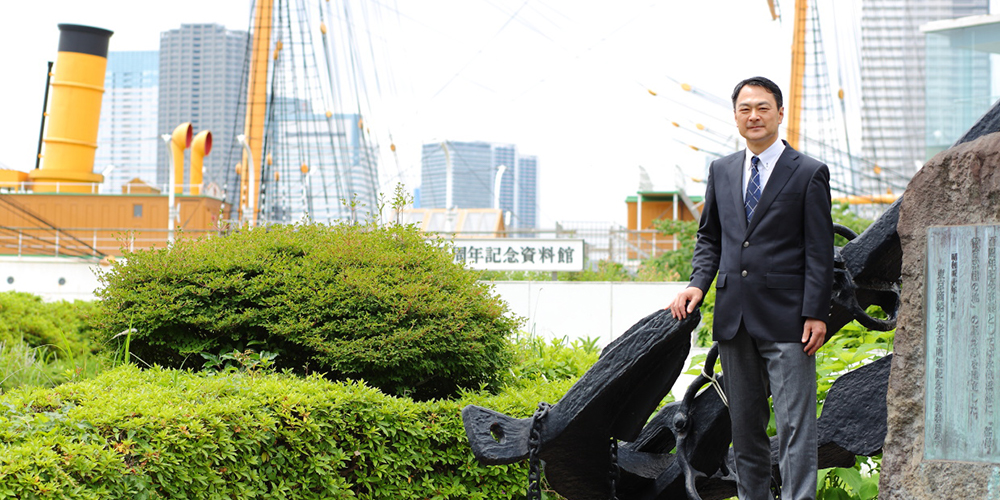People who convey voices from the sea
People who convey voices from the sea
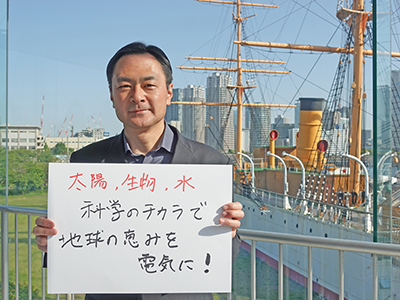
Biography
Shinichi Motoda(Shinichi Motoda)
Department of Marine Electronics and Mechanical Engineering Professor
After graduating from Tokyo University of Mercantile Marine (now Tokyo University of Marine Science and Technology),
In 1986, he joined the Tokyo University of Mercantile Marine as an assistant.
Incumbent since 2007.
From 2021, he will also serve as Dean of the Faculty of Ocean Engineering, Tokyo University of Marine Science and Technology.He has a Ph.D. (Engineering).
- Q What kind of classes do you teach?
↓
- I am in charge of Environmental Materials Science (Department of Marine Electronics and Mechanical Engineering, 2nd year).
Based on electrochemistry, students will learn about the corrosion and protection of metal materials and the mechanism of commercial batteries.
Various materials such as metal, plastic, and wood are used in various products.At manufacturing sites, it is important to know the properties of materials such as strength and resistance.Materials science can be said to be one of the basic educations in the field of engineering.
Ships, in particular, are never finished once they are built, they are meant to be used for decades.Buildings are the same, but in order to continue to use them for a long time, maintenance is always necessary.In environmental materials science, it is very important to have information about the atmosphere (environment) in which the material is used and how it is affected by the environment during maintenance. is teaching.My main research subject is metallic materials, so I will focus on lectures on deterioration and corrosion of metallic materials, and I will also learn in depth how to utilize metallic materials, such as their use in battery electrodes.
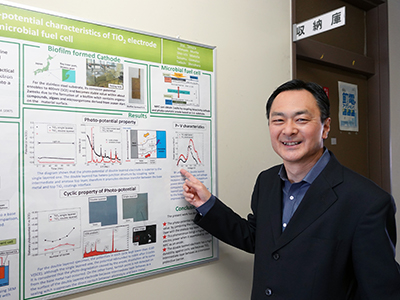
Poster presented at an international conference - Q What made you decide to become a researcher?
↓
- When I entered university, I had no intention of becoming a researcher. When I was in my senior year, I was planning to work at a shipyard after graduation, so I never thought of becoming a researcher or a university professor.However, my research supervisor told me that it would be interesting to go to graduate school, so I decided to go to graduate school. During my two years of research in the master's program at a graduate school, I realized how interesting research can be.When you're doing what you love, you lose track of time, don't you?When I'm doing an experiment in the lab, it's already 4:9 pm in a blink of an eye.As I spend my days like that, I wonder if "research" is right for me.I came to think.Also, becoming a teacher at a university requires teaching, but when I became a teaching assistant to support fourth-year students in their graduation research, that was also a lot of fun.So, I wondered if "teaching" might be suitable for me.So I chose to continue my studies at university.
- Q What was your research theme as a graduate student?
↓
- I did research on metal fatigue of materials. More than 50 years ago, there was a series of accidents in which the hull split in two and sank while navigating the ocean.The hull is made by joining metal plates together by welding.When the welded part is sailing in the ocean, it is pushed by the force of the waves.If you are hit by waves from all directions over and over again, metal fatigue can cause it to snap off.Since this phenomenon occurs in seawater, it affects not only metal fatigue but also corrosion*4.I was investigating why parts breakage due to metal fatigue, etc., and under what conditions.We observed the deterioration of the metal with a machine called a metal fatigue tester.We use various devices to observe how the metal changes until it cracks and breaks like glass. It took a long time, so I sometimes stayed at the university and did experiments during that period.It's a plain research, but I forgot the time and worked on it.
*1 Corrosion: Metallic materials are often refined from thermodynamically stable minerals (oxides, etc.) using reduction action.Therefore, it tries to return to stable substances such as oxides and hydroxides, and as a result of combining with oxygen in water and air, the metal melts or rusts.

metal fatigue tester - Q What kind of research are you doing now?
↓
- As I mentioned earlier, I was originally engaged in research to make it possible to use metals, especially metals, in seawater for a longer period of time while maintaining their properties.To put it concretely, the research is about what kind of processing (coating or plating*2) should be applied to the metal surface to prevent corrosion.
However, this kind of research is research that eliminates negative (negative) issues.Of course, this research is essential for the long-term use of the hull, but I also wanted to take on the challenge of creating a + (plus) from scratch.Therefore, I am now taking on the challenge of research that will bring new functions to metal surfaces by processing them, making use of my research results and know-how to prevent corrosion.
*2 Plating: A surface treatment that coats the surface of a metal or non-metal with a thin film of metal.
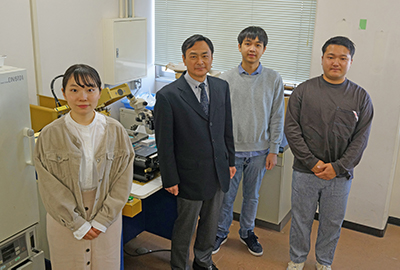
in the laboratory - Please tell us a little more about the research that creates Q + (plus).
↓
- One example is the research on "marine microbial fuel cells."
For example, if you want to set up a buoy offshore for ocean observation and take long-term records, the problem is the power supply.Even if the buoy is equipped with a battery, the power is limited.Therefore, marine microbial fuel cells are designed to generate electricity using things in the sea.
The metal surface of the positive electrode (cathode) is processed, placed in seawater, and the microorganisms that inhabit it adhere to create a layer of microorganisms called a biofilm on the electrode.The negative electrode (anode) is coated with titanium oxide and placed on the surface of the sea so that it can capture light energy.When these two electrodes are connected, when the microorganisms decompose organic matter with the light energy, electrons are generated at the anode electrode and flow to the cathode electrode to generate electricity.
By devising the processing of the electrode surface, we have succeeded in developing a battery that can generate more power than conventional microbial fuel cells and also has the advantage of preventing corrosion of the electrodes.In addition, we are also researching the use of light energy to impart an antibacterial effect by processing the surface of materials in the same way.
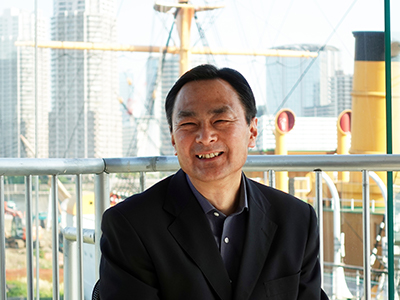
Meiji Maru in the background - Q: Looking ahead to 2030, what kind of research would you like to do with incoming students?
↓
- I think that knowing the "sea" is included in the concept of SDGs, which is always conscious of the environment.I hope that the students who will be entering the university will value “diversity” and “hands-on experience” and enjoy their research at Zebi Marine University.
First of all, "diversity", it is important to pursue one thing, but if you only pursue one thing, if it fails, you may have no choice.By learning various things at the same time and accumulating knowledge, you can change your mindset, such as if this path is unsuccessful, then let's go to the next one.I feel that you, who are about to become students, are naturally absorbing more things than our generation.I want you to cherish it.
Then there is the “hands-on” experience. At the Faculty of Marine Engineering, we have many opportunities to actually touch the ocean and ships.Being able to touch the real thing is actually a feature of our university because it is difficult to do in general engineering departments.It is an irreplaceable experience to be able to touch not only research equipment but also internal combustion engines and other machines that are working in the world today.I'm sure this experience will be useful even after I go out into the world, and I'm sure there will be ideas that spring up just because I touched the real thing.So I want you to have more and more opportunities to touch the real thing.

Internal combustion engine laboratory - Q What would you say to the younger generation who are about to enter university?
↓
- I think that Japan has gone through a period of high economic growth and has been promoting technological development for the development of the country. Looking ahead to 2030 and beyond, we must advance technological development for a sustainable society that is in harmony with the environment.In the field of ships, various ships are being developed, such as using hydrogen as propulsion fuel.It is essential for future technological development to be keenly aware of the ideas and rules of other countries and to promote cross-border cooperation.This is related to the “diversity” I mentioned earlier, but I hope that you will absorb various things and make use of them in the future.
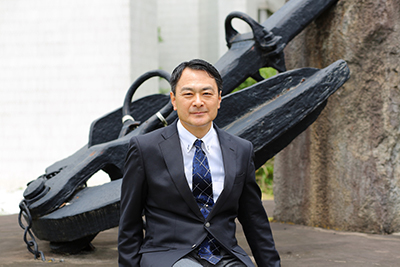
In front of the XNUMXth Anniversary Museum




